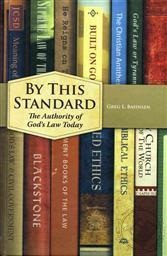 A terrific condensed book from his much larger workTheonomy in Christian Ethics. (If you're comparing page numbers it might be hard to see that since it goes from TiCE 563 pages to BTS 350 pages. But TiCE has 563 - 6"x9" pages - while BTS has 350 - 4"x6.75" pages. This makes a huge difference.) By This Standard is in many ways better than Theonomy in Christian Ethics in that it doesn't read like a master's thesis, is more digestible in its chapter lengths, is aimed at a broader audience thus more accessible for the layman, and has a great succinct section at the end refuting criticisms of his previous work on the topic. The main point of this book though is still the same: by what standard shall nations decide what is just in socio-political laws? By the standard God has revealed in Scripture. For a review of that main point, see my review of Theonomy in Christian Ethics. As for this book, Bahnsen applies the same principles of argumentation and clear exegesis but presents it in an easier tone. Of course this means his argument is not as exhaustive in this book; but it still carries the same weight. Chapter by chapter he uses Scripture over and over again to present the case. And just as before, while it is hard psychologically and emotionally sometimes to reach the conclusions he does. There doesn't seem to be any Biblical or logical reason not to come to the same conclusion. I hope every Christian interested in the Christian life, the Christian's role in social responsibility, or the nature of law, justice, and/or crime and punishment will read this book - if nothing else to at least see a view presented from Scripture that is not advocated that much today but is very hard to combat (Acts. 26:14). 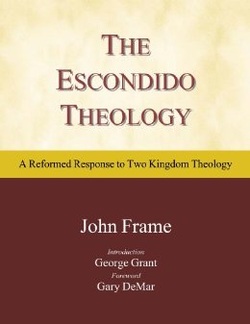 A Biblical Response to Two Kingdom Theology Here is a very interesting but very important work by Dr. John Frame. The book consists basically of several very long, very thoughtful book reviews of authors who've come from the Westminster Theological Seminary in Escondido, California. Based on the works they've produced Frame makes a very compelling case that they've developed their own "version" of Reformed theology particular just to the Escondido school. Unfortunately, as Frame goes on to show, their "version" is not truly standard Reformed theology. Furthermore, when seen through a Biblical analysis, it is at many points unbiblical theology. Taking on about a half dozen authors (including such authors as Michael Horton, R. Scott Clark, David Van Drunen, Meredith G. Kline, and Darryl Hart), Frame shows review by review how their particular outlook is simultaneously (1) not in line with standard Reformed theology, (2) particular only to the Escondido school, and (3) not at all a truly Biblical outlook. The main common denominator between the Escondido proponents is their "Two Kingdom Theology" whereby they teach in essence that it is not the church's responsibility or call to try to influence culture or society much in any way. While the exact opposite of this can be seen throughout Frame's Theology of Lordship series (and many other Reformed works by other Reformed theologians and teachers), in this work he makes a very concise application of that theology by reviewing selected works of these Escondido authors. 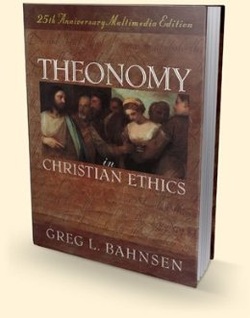 A Masterpiece of Theology, Philosophy, and Biblical Scholarship First let me say this: This book reads like a thesis (and as it started out as a thesis for a Master of Theology degree, that makes sense). But what a Biblically substantiated, exegetically sound, and theologically insightful thesis it is - by a truly gifted theologian, teacher, and communicator! It is so very rare that one comes across a book in which after finishing it he can say, "This book has truly altered the course of my life." If there is any one book - obviously apart from the Bible itself - of which this can be said by me, it is Greg Bahnsen's Theonomy in Christian Ethics. The theonomic principle as stated by Bahnsen is simply this: By "theonomy" I will mean that verbalized law of God which is imposed from outside man and revealed authoritatively in the words of Scripture" (p. 35). Theonomy is God's Law - over against man's self-law - applied in all areas of life, both in the church and in society. While throughout the history of the church it was taken on assumption that the Old Testament had abiding validity unless something in the New Testament was revealed to have cancelled or changed it in some way, in today's evangelical world just the opposite view seems to be the one most widely held: that unless a commandment is repeated in the New Testament, we should assume it no longer has abiding validity (a view with many more problems than one might think). And so Bahnsen lays out cogently, articulately, and (most importantly) Biblically in 563 pages his thesis that the Old Testament Law is just as much applicable today as it was in the days before Christ, even in the area of the civil magistrate. 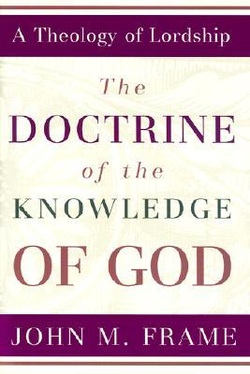 Foundational to Biblical Thinking and Application This is without doubt a foundational work in the world of theology and especially as it pertains to the philosophy of knowledge. John Frame's writing is always written with a pastoral warmth even when it's on such a topic as epistemology. It would be remiss, though, to say that this book is solely on Christian epistemology. It also is very much a book on theological method as well as apologetics. With the heart of a shepherd and all the precision of a theological surgeon, Frame takes the reader through his book in three parts: The Objects of Knowledge The Justification of Knowledge The Methods of Knowledge While this book is written well in a style that befits the layperson, the nature of the content is still very heavy at times. So this book may not be for all readers. However, for anyone in seminary or the Christian interested in philosophy (especially as it pertains to epistemology), this book is a must-read! Saturated with Scripture, a Biblical worldview, and a commitment to the Lordship of Christ in all areas of life, this book will not disappoint those seeking a deeper understanding of our relationship with the Lord Jesus, how we come to know Him as Lord, and what that means as it pertains to our relationship with the rest of the world. 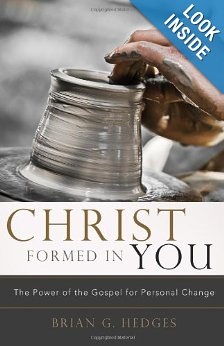 A Biblically Balanced, Christ-Centered Approach to the Christian Life Far from the two extremes of legalism and license, in Christ Formed in You author Brian G. Hedges not only takes the most important central tenet of the Christian faith - the gospel - and shows the glory of its foundation to the Christian life, but astoundingly he also shows the remarkable true nature of the gospel as both the means and the end of the full Christian life. That's the main premise of the book anyway. Hedges shows, in so many ways, that the Christian life is - and must be - saturated with a true and deep understanding of the gospel. For the gospel alone has not only the authority to demand the Christian life, but it alone has the power to enable and accomplish it. This thought is, to be sure, gravely missing from much of the church today. It's as if believers are forced to choose between "cheap grace" and with it a license to sin, or a strict discipline of "obedience" without the foundation of true transformation from within (which, as Scripture teaches, is antithetical to the true Christian life - see, Matt. 23:25-28; Jn. 15:5; Phil. 3:1-9). But Hedges shows the Biblical alternative! 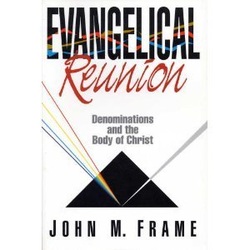 Can it be...a Biblical proposal for the break-up of denominations? In Frame's usual style of taking theological precision and pressing to see it applied by hearts stirred by God, this work is a wonderful look at denominationalism and its true Biblical warrant. Dr. Frame sets out to show that denominationalism is in fact not Biblical and only comes into the scene as a result of sin - whether by the original group, the seceding group, or both. His arguments throughout are cogent and convicting. He argues that the Lord set out to establish one united Church Body (Eph. 3:4ff) and not the factional denominations we have today (at least not in their present form). Frame is constantly calling the church back to the Scriptures which call for a unity in truth and love. His practical suggestions are helpful; and he admittedly does not have all the answers but desires for those who can provide more helpful insight into the dissolving of denominations to come forward. He shares great insights into the nature of the body of Christ, the divisional character that has come from within it, and some steps we can (and should) take, as evangelicals, toward a stronger unity in the faith. His approach is not to be seen as some rash ecumenical call to boil everything down to the least common denominator so as to be left with nothing but liberalism (and so nothing for the evangelical). 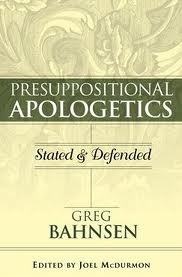 Stated and Defended Indeed This is truly an exceptional work on presuppositional apologetics. Complementary to his book, Van Til's Apologetic: Readings and Analysis, which is a comprehensive address of what presuppositional apologetics is, in this work Bahnsen offers an outright defense of presuppositional apologetics and a critique of those who have mistakenly been labeled as presuppositionalists. Part one addresses the method and defense of presuppositional apologetics as the only Biblically and theologically consistent approach to defending the faith. In chapter one, Bahnsen sets forth the presuppositional method and forcefully shows how presuppositionalism is (and must be) part of Christian theology. He demonstrates in chapter two the foundation for Christian presuppositionalism, namely revelational epistemology, and gives ample Scripture references to this effect. It must be said that if one is familiar with Bahnsen's writings or lectures, up to this point most of the material is nothing more than a heavy review, which seems very repetitive at times. However, in chapter three Bahnsen really pushes revelational epistemology to another level, effectively demonstrating the impossibility of divorcing one's metaphysic from one's epistemology. He shows that one must already know something about the state of affairs (metaphysics) before he establishes a criterion of how he can proclaim his beliefs justifiable (epistemology). One must know in order to know. This argument transitions perfectly into the presuppositional view that the unbeliever does know God (even while suppressing that knowledge); and his worldview is tainted by that metaphysic even though it is professed otherwise in his epistemology. |
Categories
All
|